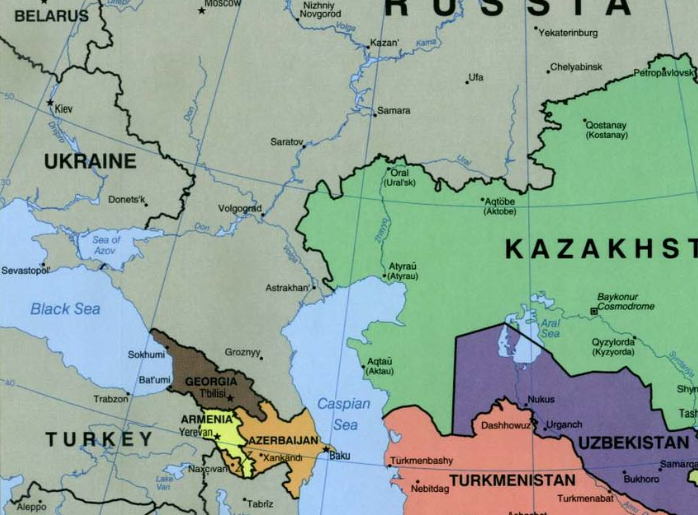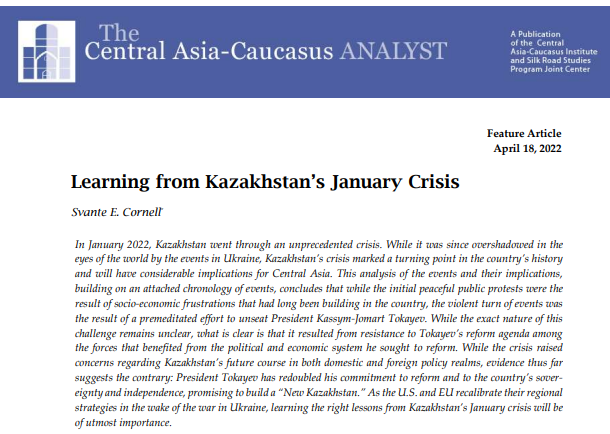With referendum, Kazakh President pushes for reforms
By Svante Cornell and Albert Barro
June 3, 2022
https://www.euractiv.com/section/central-asia/opinion/with-referendum-kazakh-president-pushes-for-reforms/

The proposed constitutional changes, following five months after the greatest unrest in the country’s modern history, accelerate the efforts by the country’s president to push for controlled political reforms. The EU, while focusing on Ukraine, should continue to engage with strategically important Central Asia.
In January this year, protests over energy price hikes spread in Kazakhstan and turned violent in the country’s largest city of Almaty. This crisis displayed the growing restlessness of the Kazakh population, but also the in-fighting among the country’s elites.
It seems clear that the violence was triggered by elites that resisted President Kassym-Jomart Tokayev’s political reforms to safeguard their privileges.
However, President Tokayev emerged from the crisis with greater authority over the country’s governing institutions. The price to pay was calling on peacekeepers from the Russia-led Collective Security Treaty Organisation.
But while many believed this would leave Tokayev indebted to Russia, events since January have proven otherwise. President Tokayev has refused to endorse Russia’s war in Ukraine. At home, far from halting his reform efforts, he doubled down: On 6 March he presented a fast-tracked package of political reforms to the nation and promptly submitted it to a constitutional referendum scheduled for 5 June.
The constitutional amendments, approved on Sunday, are closely consistent with the reform initiatives promised by Tokayev in his 16 March address to the nation.
Key themes from his address that are reflected in the amendments include revisions to the president’s powers, reformatting of the representative branch of government, improvements to the electoral system, and strengthening of human rights institutions.
Recognising that much of January’s unrest arose in protest against the government’s “super-presidential” structure, Tokayev’s reforms aim to reduce the power of the presidency. The president will no longer be permitted to be connected to a political party during his tenure, and his close relatives will be forbidden from serving as senior public servants or as heads of public sector institutions. Furthermore, the president forfeits the right to cancel actions by regional mayors.
Reducing presidential power is matched with the strengthening of parliament. Presidential appointments will now require Senate approval, and the Supreme Audit Chamber, which will oversee the national budget, is to report biannually to the lower house of parliament.
Furthermore, while in the past, the upper house adopted laws, this is now shifted to the more representative lower house, reducing the senate’s role in approving laws passed in the lower chamber.
This shift is magnified by introducing a mixed electoral system for the lower house, with 30% elected in single-member districts and 70% by party lists. Steps are also being taken to lower the obstacles to forming new political parties.
The amendments address several human rights issues too. A key amendment is the establishment of a Constitutional Court to which citizens, along with the Prosecutor General and Human Rights Commissioner, can appeal directly to challenge violations of constitutional rights. The Prosecutor General and Human Rights Commissioner also receive greater independence from other state bodies or officials.
Some initiatives that President Tokayev promised in his March address to the nation are not included in the amendments. A key area is the clarification of the rights and responsibilities of the media.
One of the most pernicious criticisms of Kazakhstan’s record concerns the rights of journalists, who are often persecuted under defamation laws. Tokayev promised a draft law on the media, which will be met with great anticipation.
The changes to Kazakhstan’s political system will not turn the country into a parliamentary democracy anytime soon. They remain within the fundamental paradigm that has been President Tokayev’s intention since his election in 2019: top-led gradual change to the existing system to make government more effective and provide greater openness without losing control.
Still, compared to Tokayev’s earlier reform packages, these reforms represent a shift: earlier reforms sought mainly to make the state deliver better services to the people and shore up its legitimacy that way.
They only aimed to build participatory and competitive politics very slowly at the local level. By contrast, the current reform package indicates that President Tokayev now sees a gradual liberalisation of the political system at all levels as necessary for the system to maintain its legitimacy.
While the EU and US are preoccupied with the Ukraine war, they should pay attention to events in Central Asia. Following the chaotic US withdrawal from Afghanistan, the region has largely disappeared from the sights of Western policymakers.
This is a mistake, as the region will be crucial to the long-term containment of both Russia and China. Supporting reform processes in Kazakhstan and its neighbour Uzbekistan, particularly the difficult implementation of reforms that are now on the books, would go a long way to helping stability and progress in the region.
A longer analysis of Kazakhstan’s reforms can be found here.
Svante E. Cornell is Director, and Albert Barro a Project Associate, with the Central Asia-Caucasus Institute & Silk Road Studies Program, a Joint Center affiliated with the American Foreign Policy Council and the Stockholm-based Institute for Security and Development Policy.
Former Soviet States Are Distancing Themselves From Their Old Imperial Master
By Erica Marat and Johan Engvall
May 12, 2022
https://foreignpolicy.com/

For many of Russia’s neighbors, the war in Ukraine has accelerated the process of breaking out of Moscow’s orbit and abandoning loyalty to Russian President Vladimir Putin’s regime. While governments from Moldova and Georgia to Kazakhstan are distancing themselves from Putin’s offensive in Ukraine, the war is also prompting a deeper reexamination of the meaning of the past in former Soviet territories. The idea of “brotherly nations” promoted by the Soviets is now overshadowed by the notion that Soviet Russia may have never pursued true equality with its neighbors—not now, nor a century ago when the Soviet empire was established through mass violence.
Thirty years after the collapse of the Soviet Union, Russia is becoming just another neighbor in the eyes of Kazakhs, Georgians, Moldovans, and others.
Several governments have shown greater independence from Moscow than expected. Last month, Kazakhstan declared it wouldn’t hold a military parade to celebrate the Soviet interpretation of its World War II victory. Earlier, Kazakhstan reportedly also refused Russia’s request to supply troops in Ukraine. Both Kazakhstan and Azerbaijan expanded cooperation in rerouting energy supplies to Europe bypassing Russia. As explained by the Kazakh deputy foreign minister, “If there is a new Iron Curtain, we do not want to be behind it.”
The more a country is politically free and allows space for the critical reappraisal of its past, the less its public is likely to support Russia’s regional dominance.
Long-serving Uzbek Foreign Minister Abdulaziz Kamilov spoke out in support of Ukraine’s territorial integrity, including in Donetsk, Luhansk, and Crimea. Perhaps due to political pressure from Russia, he was later removed from his position and appointed to another post. Kyrgyzstan’s foreign minister was sacked as well—likely because of insufficient public support of Russia’s war.
In Moldova, which depends on Russian energy supplies and hosts hundreds of thousands of Ukrainian refugees, President Maia Sandu said her government is following Russia’s actions in Transnistria with “caution and vigilance.” A few days after the Russian invasion in Ukraine, Moldova applied for European Union membership, along with Georgia and Ukraine. Both Moldova and Georgia face Russian occupation of parts of their territories (Transnistria as well as South Ossetia and Abkhazia, respectively), which they don’t recognize as legitimate.
Acts of everyday resistance to Russia’s war in Ukraine in Central Asia and the South Caucasus vary from small businesses posting “Slava Ukraini” (Glory to Ukraine!) next to their products and civil society groups collecting humanitarian aid for Ukraine to members of the public wearing yellow and blue: the colors of the Ukrainian flag. The Russian war symbols Z and V are rare or banned by the state.
Seeing the Soviet regime as a colonialist government both unites nations around a joint history of trauma and builds resistance to Russian attempts to subjugate them. Russian modern imperial ambitions in Ukraine or Georgia look offensive in these countries. The more a country is politically free and allows space for the critical reappraisal of its past, the less its public is likely to support Russia’s regional dominance.
In Kazakhstan, a critical look at its history of mass starvation that killed millions of people have now spilled from academic discussions into the public. In Georgia and Kyrgyzstan, historians and activists now openly blame the Soviet regime for purging national elites. In Ukraine, a sharp turn against alignment with Russia in 2014 came as Moscow annexed Crimea and the occupied Donbas.
Reexamining the Soviet past is taking place despite the fact that most international scholarship still sees the Soviet empire as a modernizing power of a backward people, especially in Central Asia. The seeming equality among nations of the empire and its anti-capitalist stance earned a large following among the anticolonial left in both the West and especially in formerly colonized countries throughout Asia, Africa, and Latin America.
The war in Ukraine is revealing the human costs of the empire’s expansion today even in the face of grassroots resistance. Like Putin’s increasing control of Russia today, the Soviet system was totalitarian, controlling the everyday lives of its people and superimposing Russian culture on all ethnic groups.
Distancing themselves from a romanticized view of their Soviet pasts, these societies are now generating pressure for political change at home—challenging the type of post-Soviet authoritarian leadership model that has been common across the region and has its roots in totalitarian rule. In the past several years, protesters in Armenia, Georgia, Kyrgyzstan, Moldova, and Ukraine demanded reforms to post-Soviet state institutions, such as police and intelligence services that are designed to serve the political elite and not citizens.Anti-regime collective mobilization is a sign of a more politically engaged society that expects participation in decision-making and free elections. Ukraine’s resistance to Russian occupation is the ultimate example of how domestic pro-democracy mobilization rejects authoritarian rule.
In the face of this tide of new expectations, incumbent autocratic leaders are increasingly in peril. For example, in Russia’s closest ally, Belarus, President Aleksandr Lukashenko only managed to survive a prolonged popular uprising in the fall of 2020 once he received support from Putin. Lukashenko was able to suppress the protests, but the collective grievances of Belarus’s society have not been solved. In the early days of the invasion, Belarusian railway workers sabotaged Russia’s supply of equipment to Ukraine. The brave act damaged Russian logistics, preventing the Kremlin from moving troops and materiel forward.
Kazakhstan’s political setup is similar to Russia’s—a president sits at the top of a pyramid of power, doling out posts and assets to allies in return for loyalty and a cut of the spoils. But following Kazakhstan’s nationwide uprising in January, the country faces the test of transforming into a more representative political system. Despite decades of authoritarianism, citizens mobilized in historic protests to demand better economic opportunities and the end of the president’s unlimited political power. Many in Kazakhstan’s uprising were young people of the same age as the independent state itself. They now see themselves as agents of change, willing to risk more than their parents could stomach.
Moscow’s ability to influence national decision-making processes in former Soviet territories appears to be waning. Despite Moscow’s objections, Russian only remains a state language in Belarus, although it retains the status of an official language in Kazakhstan and Kyrgyzstan. Azerbaijan switched from the Cyrillic to the Latin alphabet in the early 1990s while Uzbekistan and Kazakhstan are at different stages of the same transition.
Only four countries have joined the Russian-led Eurasian Economic Union, and the intergovernmental military alliance the Collective Security Treaty Organization (CSTO) has six members, Russia included. Both of these Russian-led organizations are likely to become ever more unpopular among political incumbents and the public. Even after the CSTO intervention in Kazakhstan in January, which helped President Kassym-Jomart Tokayev secure his hold on power, the Kazakh government has shown greater opposition to Moscow’s war than expected.
Russian political influence is also declining because Russian culture is losing its dominant position and has to compete with other worldviews for the hearts and minds of younger generations. These more diverse generations are formed by domestic as well as foreign influences, whether from Turkey, the Persian Gulf, or Europe. Traditional and nationalist-oriented values tend to resonate in more rural areas while liberal ideas and values are usually concentrated in urban centers. Large pro-Ukraine protests were held in Georgia, Kazakhstan, and Moldova. Even in countries like Kyrgyzstan, where the government banned antiwar protests, a few brave activists still filled the streets.
Rather than be pawns that are moved around on the Kremlin’s chessboard, Russia’s neighbors are increasingly turning into active players in the international arena.
Separation from Russia does not necessarily mean these countries will seek a closer alignment with the West. Political incumbents in Central Asia and the South Caucasus may be more inclined to seek closer ties with China and Turkey. Countries that depend on Russia’s political and military support—notably Armenia, Kyrgyzstan, and Tajikistan—may still show careful support of close ties with Moscow. But even there, political leaders shied away from publicly siding with Putin’s rhetoric of “denazification” in Ukraine. The unpredictable consequences of Russia’s war might leave these states no other choice but to diversify their diplomatic relations.
Rather than be pawns that are moved around on the Kremlin’s chessboard, Russia’s neighbors are increasingly turning into active players in the international arena—and have not hesitated to play external powers against one another to extract maximum benefits. They prefer to maintain ties with many regional powers; Russia is becoming just another neighbor, along with the EU, China, Turkey, and Iran.
In that way, Central Asian countries are becoming more like other countries in Asia and Africa—searching for multilateralism rather than solely attaching themselves to one actor: Russia. The ability of these states to resist Moscow’s pressure to support the invasion of Ukraine would not have been possible without their long-standing efforts to preserve their sovereignty and identity themselves by diversifying their diplomatic alliances.
To understand the effectiveness of Russian power in the former Soviet space, it is no longer sufficient just to know the Kremlin’s intent. Former Soviet colonies are on the verge of breaking away from the last remaining legacies of Soviet rule. The war in Ukraine points at the need to consider countries formerly occupied by the Soviet regime as entities with their own complex domestic processes despite Russia’s efforts to direct and dominate them.
Many citizens of former Soviet states in Central Asia and the South Caucasus now see Russia as a belligerent neighbor engaging in genocidal violence rather than as an historic ally. Time is thus not on the side of Putin’s imperialistic and nationalist crusade to reassert Russia’s exclusive control over its neighboring countries—because Moscow’s neighborhood is no longer a collection of its former colonial subjects.
A New Horizon for the United States-Uzbekistan Relationship
By Mamuka Tsereteli, Ph.D. and Anthony B. Kim
April 25, 2022
https://www.heritage.org/asia/commentary/new-horizon-the-united-states-uzbekistan-relationship

America’s partnership with Uzbekistan has become more relevant than ever. This former Soviet state is an ally against Russia, has an emerging market-based economy, and possesses significantly undervalued natural assets.
Capital Tashkent’s relationship with Washington entered what has been called “a new era of strategic partnership” during President Shavkat Mirziyoyev’s historic first visit to the White House in 2018.
More recently, during his March 9 meeting with Uzbek Foreign Minister Abdulaziz Komilov, Secretary of State Antony Blinken underscored, “We appreciate the strategic partnership between Uzbekistan and the United States, the work that’s being done through that; very much welcome the strong humanitarian support that you’ve been providing to the Afghans on one hand and now Ukrainians on the other.”
In his recent speech to Uzbeki lawmakers, Komilov said that Uzbekistan does not recognize the pro-Russia separatist-controlled districts in Ukraine’s Donbas region and called for a “peaceful solution” to end Russia’s unprovoked invasion of Ukraine.
Indeed, the U.S.-Uzbekistan relationship has gained greater strategic importance with the passage of time. The United States was among the first countries to recognize Uzbekistan’s independence from the Soviet Union in 1992 and has maintained growing bilateral relations in the 30 years since.
Uzbekistan is strategically located and the most populous country of Central Asia. Though it still has a long way to go, the country has been transitioning from a command-and-control economy to a market-based economy, propelled by a wide range of reforms, particularly since 2017.
According to The Heritage Foundation’s annual Index of Economic Freedom, the Uzbekistani economy has grown notably over the past five years. Economic freedom has also advanced during the same period. With large increases in scores for investment freedom and financial freedom, Uzbekistan has recorded a 3.4-point overall gain in economic freedom since 2017 and is in the middle ranks of the “Mostly Unfree” countries.
Also notable is that the country, which is the eighth-largest producer and the 11th-largest exporter of cotton in the world, has eradicated systemic forced labor and systemic child labor, according to new findings by the United Nations’ International Labour Organization. That progress has resulted in the end of the international boycott of Uzbek cotton.
Going forward, emerging economic challenges further complicated by an elevated level of uncertainty will require significantly accelerated reform efforts for Uzbekistan to fully realize its economic potential.
The country is making progress in reforming its governance and public services, however, taking steps that are having an impact on the lives of ordinary citizens and making it easier for businesses to operate there.
It is also strategically better positioned than other countries of Central Asia to meet evolving new challenges: It does not share borders with Russia nor is it a member of either the Russian-led Eurasian Economic Union or the Collective Security Treaty Organization, which means it is significantly less dependent on Russia than many other former Soviet states.
But mitigating these emerging risk factors will require a new, even more dynamic economic strategy.
First and foremost, the government needs to further strengthen macro-economic stability and ensure structural reforms by supporting the private sector and reducing the role of the state in the economy. That includes boosting the privatization of state assets in all sectors.
Privatization, as well as tax and regulatory reforms, should be focused on attracting more foreign direct investments from a wide range of countries. Companies with solid investment plans, management, and technological know-how should be given priority. Uzbekistan has significantly undervalued assets, and with the proper packaging and government incentives, it should attract sizable foreign investment.
While the future success of Uzbekistan will rest in large part on the shoulders of Uzbeks themselves, America’s continuing strategic support remains essential for forwarding the reforms Uzbekistan has been charting.
Fundamentally, America’s economic engagement with Uzbekistan will be best exercised through constructive private-sector engagement that can be the catalyst for a sustainable and comprehensive economic transformation for the nation.
As this year marks the 30th anniversary of the establishment of diplomatic relations between the United States and Uzbekistan, it is in America’s interest to push forward this opportunity to enhance practical bilateral trade and investment with this vital partner in Central Asia.



